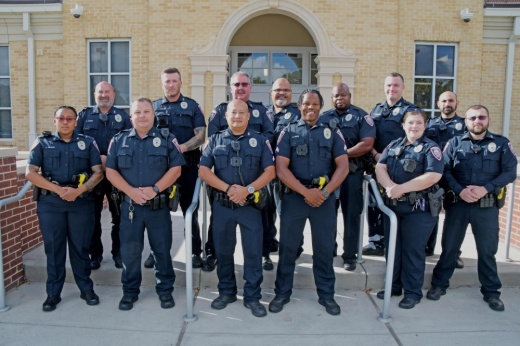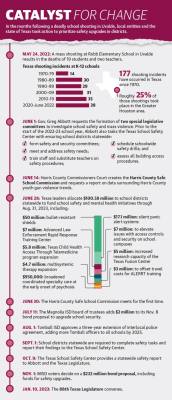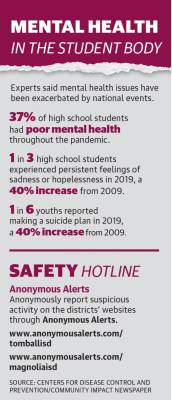At an Aug. 1 Tomball City Council meeting, council members approved a three-year extension of the interlocal agreement between the city of Tomball and Tomball ISD. The extension also increases the number of school resource officers, or SROs, annually from nine in the 2021-2022 school year to 15 in the 2024-25 school year.
Tomball police Chief Jeff Bert, who presented the extension to council, estimated the cost of personnel alone will be approximately $1.8 million for 15 officers. Bert said in an interview that beginning in the 2022-23 school year, each SRO would be assigned a TISD elementary school to ensure all 11 schools were covered.
Both Bert and Tomball ISD Chief Operating Officer Steven Gutierrez emphasized the importance of detecting threats in schools before they begin. Bert also voiced his belief in a “restorative justice” approach to policing, saying he hopes to get people to a better place before they end up needing to be detained.
“The more we hold hands earlier, the less we handcuff later,” Bert said.
Bert said the city was negotiating with TISD for a possible further increase in officers but could not provide specifics.
Magnolia ISD, meanwhile, recommended adding $2 million to its $230 million bond proposal for security at its July 11 board of trustees meeting. According to Denise Meyers, the district’s director of communications, the bond funds would allow the district to look at potential future upgrades. MISD voters will decide on the total $232 million proposal Nov. 8.
“We’re going to have to figure out [what the funds are going toward],” Meyers said. “But now, [Superintendent] Dr. [Todd] Stephens said, ‘Hey, we have this bond proposal, but in light of what’s happened, let’s look at adding $2 million and what that looks like.’”
MISD also maintains a partnership with Montgomery County Precinct 5 Constable Chris Jones’ unit with county constables stationed at all MISD schools, according to Meyers.
Conversations about school safety in Texas at the start of the school year are taking place following the May 24 shooting at Robb Elementary School in Uvalde. Following the shooting, Gov. Greg Abbott distributed $100 million to school districts across Texas on June 28. The funding was directed to upgrading equipment, training officers and improving mental health.
The Texas Legislature did not call a special session to respond to the Uvalde shooting. However, state Sen. Brandon Creighton, R-Conroe, who chaired the Senate Education Committee in the 87th legislative session, said in an email investing in school infrastructure for safety is one of his top priorities.
“There will be significant investments to give schools proper resources to keep their campuses safe, and the Legislature will also mandate security measures and audits to ensure that every district and school is prepared to prevent bad actors from harming students,” Creighton said. “Additionally, the state will continue to increase mental health funding and resources to assist young Texans who seek help.”
TISD officer training
Bert said Tomball police officers are trained to deal with “high-profile” emergency situations such as shooters. Following Abbott’s June 28 announcement, Bert confirmed that all Tomball police officers had completed Advanced Law Enforcement Rapid Response Training.
However, Bert said most day-to-day SRO duties do not always match the training they receive. He described his officers’ daily duties as “police officer first and foremost, teacher and counselor to a degree,” though he clarified officers do not receive formal counseling training.
Bert said the average cost of an SRO, including insurance and training, is about $120,000. According to the agreement the city approved Aug. 1, the district will pay 75% of the costs for the new officers. Previous council meetings have included discussions on the city renegotiating its contract with the school district. However, Gutierrez said exploring the creation of an independent TISD police department was “not an option.”
“We’re very happy with our arrangement with the city,” he said.
In addition, TISD Communications Director Allison Suarez confirmed $3.4 million approved in the district’s 2021 bond for security was used to upgrade older security barriers and electronics.
Gutierrez said in the aftermath of Uvalde, TISD’s Health and Safety Plan, which is reviewed annually, was given “extra scrutiny.” He described the district’s efforts in safety as “ahead of the game.”
“We’ve really invested before Robb Elementary—investing in socio-emotional, trying to help teachers unpack trauma [and] stressors,” he said.
Gutierrez confirmed TISD has audited its campus entry points with any access points found not up to standard fixed before the first day of school Aug. 16. He also confirmed the creation of a new assistant director of operations position to oversee the implementation of safety protocols prior to the 2022-23 school year.
MISD safety priorities
Meyers said improvements were made to districtwide security vestibules and cameras through MISD’s $92 million bond approved by voters in 2015. She said the $2 million added to the 2022 proposal would scope out other improvements.
“Do we need to add additional cameras; do we need to look at other items?” Meyers said. “The bond committee will have to look, but the board committee felt it was important to have that.”
Nineteen Precinct 5 officers serve MISD schools, Meyers said. Each high school has two officers stationed, while all other campuses have one each.
In terms of mental health support, Meyers said MISD uses a program called Character Strong, a program that develops socio-emotional learning curricula tailored to various age groups. The district also has a partnership with Tri-County Behavioral Healthcare, a federally qualified health center serving Montgomery, Waller and Liberty counties.
“We want to make sure our students have access to as many resources as possible,” Meyers said.
Looking forward
Bert, Gutierrez and Meyers all discussed striking a balance between keeping the school community safe and over-surveilling kids.
“It’s kind of hard to answer. Especially after what happened in Uvalde, you can never really do enough,” Gutierrez said. “It is going to be a careful balance, almost as if we’re not there. But I don’t want it to seem like it is an institution. Part of it is not seeing the SRO in uniform and not seeing it as a scary thing.”
Meyers said she believes maintaining that balance is one of the biggest needs of school safety.
“We want to make sure that parents are welcome to come in and have lunch with their child or come in for a program so we have safety mechanisms for our parents and visitors,” Meyers said. “It should still be a school where kids can go out and play but also be safe and secure in their classrooms.”
Bert also said he believes law enforcement should improve its ability to work through social media to spot warning signs.
Ahead of the 88th legislative session, which will begin in January, Creighton said legislators will work to increase access to mental health support. He pointed to the Legislature’s $745 million investment into research creating networks for children’s mental health in 2019.
“Year after year, the Texas Legislature has prioritized mental health funding, and the 2023 session will be no different,” Creighton said. “The $100 million the governor deployed is a good start, but lawmakers will work diligently to ensure communities large and small have the mental health resources they need.”
Peyton MacKenzie contributed to this report.







